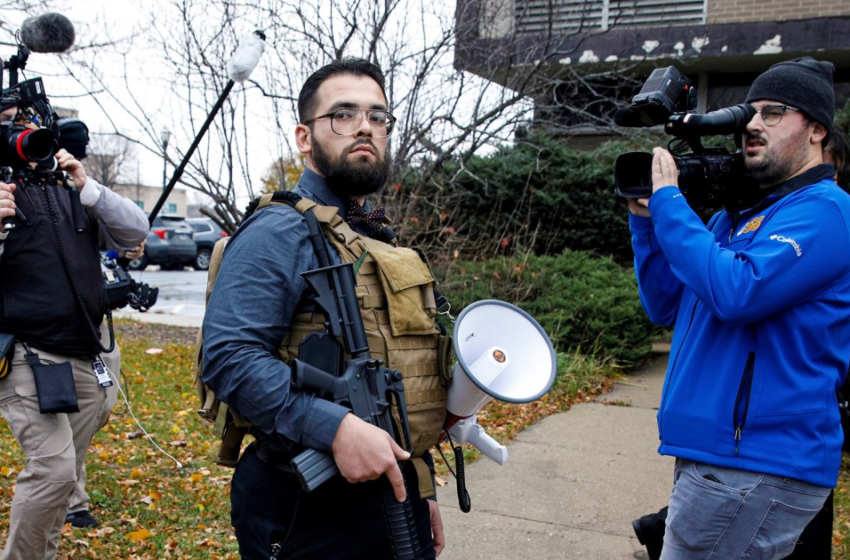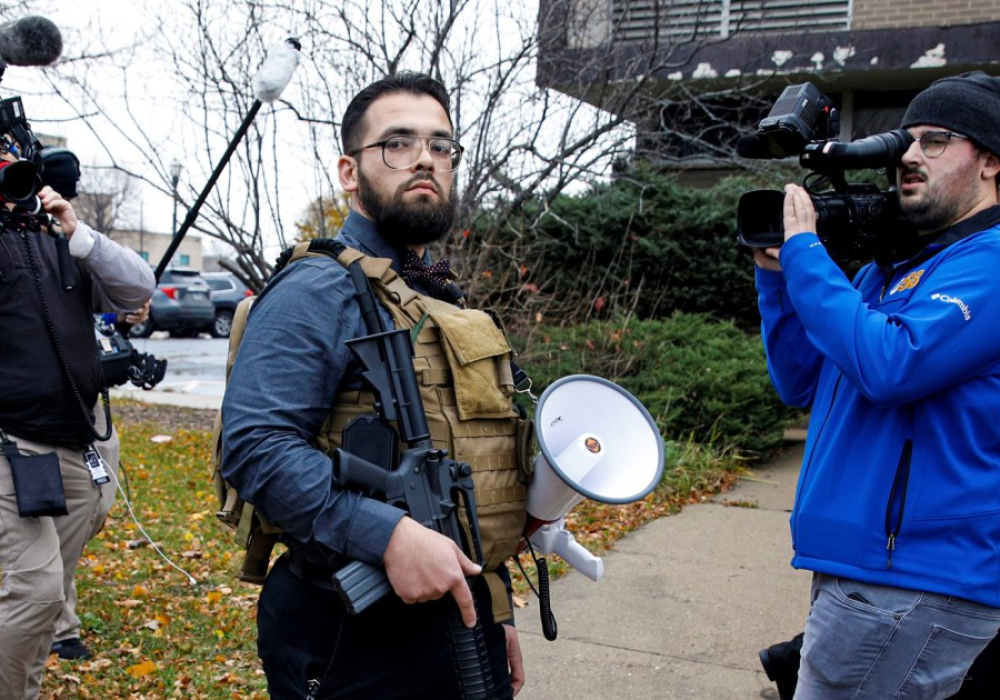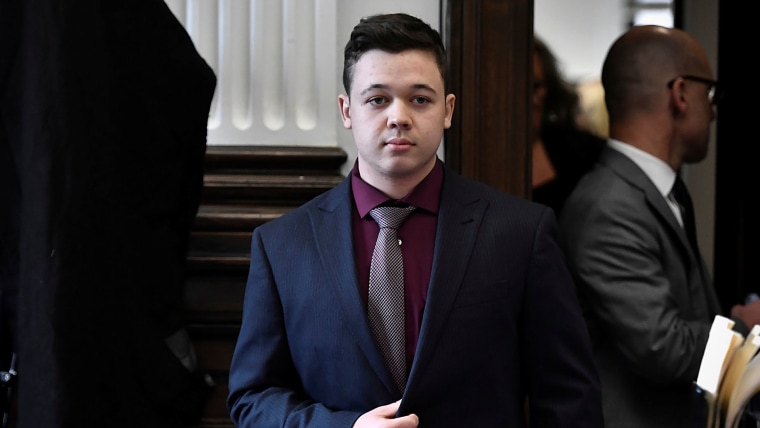KENOSHA, Wis. — The acquittal of Kyle Rittenhouse on all charges, including homicide, is not expected to end America’s debate over gun control and the Second Amendment or the heated conversations about when armed protection of a community crosses the line into vigilantism.
Rather, the worry is over what comes next.
Anti-gun violence groups and some Second Amendment experts who followed the trial, in which Rittenhouse claimed self-defense when he fatally shot two men and wounded a third during a night of unrest in August 2020, are raising concerns that people may seize on the outcome and feel empowered to defend their neighborhoods while bearing arms, particularly during volatile events.
A trial taking place in Georgia, in which three white men are facing murder and other charges in the pursuit and fatal shooting of Ahmaud Arbery, a Black man who was jogging in their neighborhood in February 2020, centers on the defendants acting against someone they assumed was a threat, seeking to detain him in a citizen’s arrest and fatally shooting him when, according to them, they feared he was grabbing for a shotgun one of them was holding.
“The Rittenhouse trial, the story of the killing of Ahmaud Arbery and now the direction that the Supreme Court seems to be heading on carrying guns outside of the home all point in the same troubling direction: many people, white men especially, coming to believe that they have the right to carry assault weapons to thrust themselves into dangerous situations and then claim they are threatened,” said Michael Waldman, the president of the Brennan Center for Justice at the NYU School of Law and author of “The Second Amendment: A Biography.”
“It’s a recipe for racially charged violence.”
While the separate trials of Rittenhouse in Wisconsin and the three men in Georgia — Travis McMichael, his father, Gregory McMichael, and their neighbor, William “Roddie” Bryan — were anchored by similar claims of self-defense, the prosecution in both cases tried to sway the respective juries into believing the defendants were acting like vigilantes who took the law into their own hands.
That argument didn’t sit well with trial watchers like Emily Cahill, who lives near Chicago and traveled to Kenosha to lend her support to Rittenhouse while the jury deliberated. All week, she held firm in front of the local courthouse saying she believed Rittenhouse, who was 17 when he armed himself with an AR-15-style rifle and arrived in Kenosha in the midst of protests against racial injustice, acted to protect himself.
“We need armed civilians to be able to protect themselves and the community when the government fails to,” said Cahill, 33, who hoisted a sign that read “Self-defense is not a crime.”
“There needs to be a bridge between the community and the police,” she said, adding that she believes more guns on the streets and community policing can deter criminal activity.
One state-based advocacy group, the Wisconsin Gun Owners Inc., which opposes all gun control, has been calling for stronger self-defense laws much of this year.
“The community is learning that sometimes we have to take personal responsibility for the protection of our communities,” said Thomas Leager, the group’s executive director, adding that citizens need to be able to protect property and businesses.
But that’s exactly what worries Ryan Busse, a former gun industry executive who is now a senior policy adviser to Giffords, the gun safety group founded by former Arizona Congresswoman Gabby Giffords.
While the judge in Rittenhouse’s case often repeated “this is not a political trial,” a partisan political divide imbued in national issues from race and policing to education to vaccines combined with the spread of extremist ideologies online, militia groups openly carrying firearms at state Capitol protests, and the marketing of guns with names such as Ultimate Arms Warmonger and Urban Super Sniper are only driving the idea of “vigilante justice,” Busse said.
In addition, the U.S. Supreme Court earlier this month heard arguments in a case of whether the Constitution provides the right to carry a gun outside the home. The court’s conservative-leaning majority appeared skeptical of a New York law that requires showing a special need to get a permit to carry a concealed handgun in public and suggested they believe the legislation violates the Second Amendment right to “keep and bear arms.” The high court is expected to issue a decision in the case by June next year.
The Rittenhouse trial and these other cases are “feeding this idea that individual citizens need to be out there, not as part of a functioning society, but as these rogue dispensers of justice,” said Jeri Bonavia, the executive director of WAVE Educational Fund, a grassroots organization in Wisconsin focusing on preventing firearm deaths and injuries.
Meanwhile, gun sales in the U.S. have soared in the past year amid the pandemic. Last year, almost 39.7 million firearms background checks were conducted, according to the FBI’s database, up from 28.4 million the year before and more than double the 14.4 million in 2010.
The flood of more gun owners could prove a dangerous mix in certain situations and furthermore, Rittenhouse’s acquittal can be taken as a win for gun owners and advocates, said Ion Meyn, an assistant law professor at the University of Wisconsin-Madison.
“We’re giving more rights to someone who has a gun than someone who is unarmed on the street. And we’re giving him more legal protection to use deadly force. That’s a dangerous precedent,” he said. “It’s not a right to defend yourself, it’s a right to shoot people.”
But lost in the conversation as well is whether what happened in Wisconsin and Georgia will motivate lawmakers in states to re-evaluate laws surrounding self-defense, citizen’s arrests and the open carrying of firearms.
In the wake of Arbery’s killing, Georgia repealed a citizen’s arrest law predating the Civil War, ending people’s right to detain someone if a crime is committed in their presence “or within their immediate knowledge.” The law, however, does not apply to businesses that witness criminal activity on their premises.
Most states have some variation of a citizen’s arrest law, according to Reuters, and Georgia is one state that overhauled its legislation after Arbery’s death.
Meanwhile, some states have moved to expand so-called stand your ground laws, including Ohio, whose Republican governor, Mike DeWine, signed legislation in January that eliminates a duty to retreat before firing in self-defense at any place, including businesses, places of worship or during protests.
“It is vital that law-abiding citizens have the right to legally protect themselves when confronted with a life-threatening situation,” he said earlier this year.
But Busse said such life-threatening situations are not as clear-cut, highlighted by the chaotic events in the Rittenhouse and the Arbery cases. The introduction of guns into any scenario, he added, could once again turn explosive under the right circumstances.
“I don’t think there’s going to be another Kyle Rittenhouse,” he said, “there’s going to be a lot more.”
Deon J. Hampton reported from Kenosha, and Erik Ortiz from New York.











